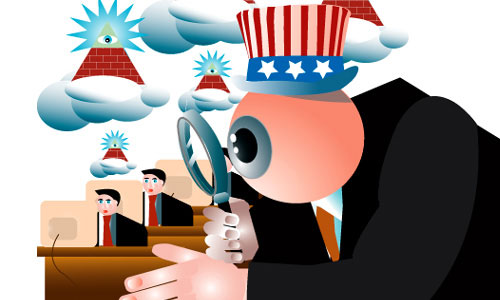 By Dennis Loo
By Dennis Loo
The New York Times is reporting in its lead story April 1, 2010 that the government’s warrantless surveillance over all us has been dealt a blow by a ruling of the chief judge of the
“In a 45-page opinion, Judge Vaughn R. Walker ruled that the government had violated a 1978 federal statute requiring court approval for domestic surveillance when it intercepted phone calls of Al Haramain, a now-defunct Islamic charity in Oregon, and of two lawyers representing it in 2004. Declaring that the plaintiffs had been ‘subjected to unlawful surveillance,’ the judge said the government was liable to pay them damages.”
There is good news here, very good news, but there is also bad news. The NYT broke this story of Bush’s express violations of FISA in 2005, as the story states. (FISA, by the way, has always had retroactive approval provisions for the government to use, so the argument that by-passing FISA was necessary was always a lie). But the Times sat on that story for a year. Had it been released in October 2004, when they first had the story, the 2004 "re-election" of Bush would have been thrown into even further doubt.
Further, the felonious warrantless surveillance began NOT after 9/11 as today’s Times story incorrectly states. It began in February 2001; just weeks after Bush took office. As former CIA analyst Ray McGovern has revealed:
"[S]even months before the threat of terrorism got President George W. Bush’s attention (despite the best efforts of then-counterterrorism chief Richard Clarke to install it on everyone’s screen-saver, so to speak), the administration instructed NSA to suborn American telecommunications companies to spy illegally on Americans.
"The general counsel of Qwest Communications advised management that what NSA was suggesting was illegal. And to his credit, the head of the company at that time stuck to a firm ‘No,’ unless some way were found to perform legally what NSA wanted done.
"Qwest’s rivals, though, took their cue from the White House, and adopted a flexible attitude toward the law—and got the business."
This latest Times story leads by stating that "A federal judge ruled Wednesday that the National Security Agency’s program of surveillance without warrants was illegal, rejecting the Obama administration’s effort to keep shrouded in secrecy one of the most disputed counterterrorism policies of former President George W. Bush." In putting it this way, the Times is accepting Bush’s and Obama’s claims that these are "counterterrorism" policies. Their spying is not a counter-terrorism policy. If it were, why did Bush begin illegally and secretly tapping all Americans’ phone calls and email in 2/01, long before 9/11?
By framing this dispute as one of "counterterrorism" v. civil liberties, the Times gives grist for argument to the government’s outrageous infringements of citizens’ rights to privacy and to be left alone by Big Brother. The government’s spying, for those who say, "I don’t have anything to hide," means that members of Congress and Judges are also being spied upon.
How willing, do you think, would your public officials be to contest these violations (or any other) when they know that the White House or some other government arm could out them or fabricate charges against them? What then becomes of your vaunted "separation of powers?" What then becomes of freedom from government tyranny?
